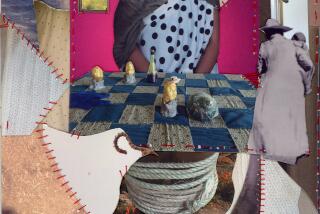So Long to the Last Great Dreamer
- Share via
John Ferris died the other day. John Lyman Ferris. He liked his name stretched out. It provided him with a sense of greatness that shorter names did not possess. It was, in its way, a heroic name.
Don’t trouble yourself trying to recall who he was. You probably wouldn’t know. But those close to him knew him as one of the great adventurers of our time. He should be mentioned in the same context as Christopher Columbus, Sir Edmund Hillary and Meriwether Lewis.
True, John didn’t have a single real adventure that I can recall, but his dreams were so vivid and his plans so vast that we could not help but think of him as boldly going forth. There was much of Walter Mitty in John Lyman Ferris and perhaps a touch of Don Quixote.
I write of him today because there is a need for dreamers in a world increasingly shaped by the limited vision of pragmatists. There is a need for those who cross oceans of imagination and tilt at windmills of the mind.
We have so few to begin with, and now there is one less.
*
I knew John from our reporting days at the old Oakland Tribune. Like any dreamer, his mind was often elsewhere, beyond the mundanities of police reporting and local politics. Because of that tendency to drift, he was almost always late for work, to the annoyance of an editor whose measure of efficiency was punctuality.
Then one autumn morning when daylight saving time had changed to standard time, instead of arriving at 9:15, exactly 15 minutes late as usual, John had failed to reset his clock and arrived at 8:15, to which the editor roared, “Great God, man, even when you’re early you’re late!”
Hours could never contain his dreams. His visions of discovery far exceeded the time-clicks that confine us to our small everyday priorities.
He read all the great adventure stories and talked endlessly of archeological mysteries awaiting him in the Andes, and human history needing to be unearthed in Africa. But his main desire was to mount an expedition to Subic Bay in the Philippine Islands. He had obtained a map that was said to locate the wreckage of a Japanese ship loaded with gold stolen during the Second World War.
John had been in that war and had been wounded twice at Anzio. Later, having moved to the South Pacific, he contracted malaria and suffered from it for the remainder of his life. He felt the war owed him something, and the millions stashed away in that sunken freighter would help to pay him back.
I remember sitting with him over drinks in an Oakland bar called the Hollow Leg, listening to his plans for an expedition to the Philippines. John had a wife and two small daughters, and newspaper pay in those days was at best modest. How, we asked, could he afford an expedition anywhere?
He replied in grand dismissal of our plebeian concerns that money was no object. Then, studying our doubtful expressions, he suddenly roared with laughter, and we all joined in, laughing until we cried, until the windows shook, until we were gasping for breath.
It was an affectionate acknowledgment that John’s plans were mostly dreams. We all knew that, and I guess he knew it too. The moment simply proved that shared laughter can, in the best sense, affirm without dismissing.
*
Subic Bay never happened. But John did manage to get his hands on an oceangoing catamaran. We never knew how, and to this day neither do his surviving daughters, Ruth and Mary. It emerged from his dreams, like a ship from a fairy tale.
He announced one summer that he was going to England. We kidded him that England had already been discovered, but he went anyhow. Sometime later, the catamaran was shipped to him and he stood aboard it proudly at the Oakland Marina, an admiral of his airy fleet.
It was to have been the vessel that would take him across the sea to the sunken treasure, but, of course, there was never enough money to take it anywhere or even to keep it berthed at an expensive marina. The catamaran disappeared one day. We think John sold it or gave it away. It would not have been proper to ask.
He did make it to Mexico’s Yucatan Peninsula once, chaperoning a group of Explorer Scouts. His true mission was to search for Mayan treasures, but when the Scouts balked at hacking through jungles for treasures that probably didn’t exist, John gave up in disgust and brought them home. It was his only real expedition, and it didn’t work.
He was above nonsense in his dreams of glory. He saw himself the way any great adventurer sees himself, braving wind and weather to reach the mist-shrouded land beyond the horizons of illusion, then kneeling before a queen to receive his knighthood. Sir John Lyman Ferris, Knight of the Imagination, Keeper of the Dream Gate.
John suffered a stroke five years ago, and during the remaining days of his life, the gold at the bottom of Subic Bay slowly lost much of its enticing glow. Reality told him it was at last out of reach.
But I still suspect that when he finally slipped gracefully into his dreams a few days ago, there remained a faint glow in the enclosing darkness. Sir John Lyman Ferris was a dreamer who would never totally abandon his quest. He left that lesson for those of us who also dream of distant places across the endless expanses of imagination.
*
Al Martinez’s column appears Mondays and Thursdays. He is at al.martinez@latimes.com.
More to Read
Sign up for The Wild
We’ll help you find the best places to hike, bike and run, as well as the perfect silent spots for meditation and yoga.
You may occasionally receive promotional content from the Los Angeles Times.






